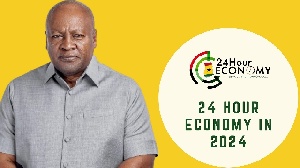Business News of Thursday, 8 May 2025
Source: www.ghanawebbers.com
President Mahama delivers on 24-hour economy promise within first 120 days
President John Dramani Mahama has announced progress on his 24-hour economy policy. This fulfills a key campaign promise within his first 120 days in office.
At a press briefing, President Mahama stated that the rollout has begun. He said, “We promised to draft legal amendments and prepare for implementation within 120 days — and we have delivered.”
He revealed that Cabinet approved important changes to the Ghana Investment Promotion Centre (GIPC) Act and the Labour Act. These changes aim to enhance social protection and support round-the-clock economic activity.
Several government institutions have already started operating 24/7 with positive results. The Ghana Investment Promotion Centre now offers 24-hour premium services for investors.
The Ministry of Foreign Affairs has launched a 24-hour passport service. The Driver and Vehicle Licensing Authority (DVLA) is using extended hours to clear an 18-month backlog of license applications.
The employment impact of this policy is also emerging. President Mahama announced the Youth Employment Agency (YEA) will launch the Graduates in Corporate Support Programme. This initiative will deploy 20,000 graduates to businesses operating around the clock.
To improve security during nighttime operations, the Ghana Police Service is creating a 24-hour police unit. This unit will focus on night patrols and use advanced surveillance technology.
On energy matters, Mahama shared that the Energy Ministry is working with the Public Utilities Regulatory Commission (PURC). They plan to introduce smart meters with time-of-use tariffs to encourage off-peak energy use.
Private sector interest in this policy has increased significantly. Many businesses are ready to participate in this initiative.
President Mahama stated, “We are pursuing new avenues of job creation.” He emphasized expanding opportunities for young graduates and positioning the private sector as vital for sustainable growth.
He believes that the 24-hour economy policy will drive structural transformation across key sectors like agriculture, manufacturing, and tourism.
“This program will serve as a catalyst for long-term economic renewal,” he said, “anchored on innovation, productivity, and inclusive growth.”











